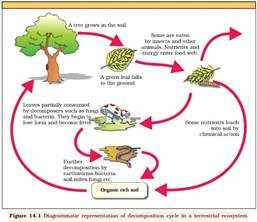Define decomposition and describe the processes and products of decomposition.
Decomposition is the process of breaking down of complex organic matter with the help of decomposers into smaller inorganic raw material such as CO2, H2O, and other nutrients. It constitutes of various processes:
1. Fragmentation: The breakdown of detritus (Organic matter) into smaller pieces by the action of detritivores (earthworms).
2. Leaching: The water-soluble nutrients move down into the layers of soil and get locked as unavailable salts.
3. Catabolism: Further the detritus is degraded into smaller pieces by bacteria and fungi through various enzymes.
4. Humification: Humification leads to the formation of a dark coloured colloidal substance called humus, which acts as reservoir of nutrients for plants.
5. Mineralization: The process of releasing inorganic nutrients from the humus in the soil is done by microbes and this process is known as mineralization
Decomposition thus leads to the production of a dark coloured, nutrient-rich substance called humus. Degradation of humus releases inorganic raw materials such as CO2,water, and other nutrient in the soil.
